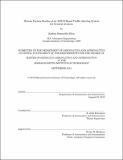| dc.contributor.advisor | R. John Hansman. | en_US |
| dc.contributor.author | Silva, Sathya Samurdhi | en_US |
| dc.contributor.other | Massachusetts Institute of Technology. Dept. of Aeronautics and Astronautics. | en_US |
| dc.date.accessioned | 2013-02-15T14:40:18Z | |
| dc.date.available | 2013-02-15T14:40:18Z | |
| dc.date.copyright | 2012 | en_US |
| dc.date.issued | 2012 | en_US |
| dc.identifier.uri | http://hdl.handle.net/1721.1/77116 | |
| dc.description | Thesis (S.M.)--Massachusetts Institute of Technology, Dept. of Aeronautics and Astronautics, 2012. | en_US |
| dc.description | Cataloged from department-submitted PDF version of thesis. This electronic version was submitted and approved by the author's academic department as part of an electronic thesis pilot project. The certified thesis is available in the Institute Archives and Special Collections. | en_US |
| dc.description | Includes bibliographical references (p. ). | en_US |
| dc.description.abstract | Several recent high profile mid-air collisions highlight the fact that mid-air collisions are a concern for general aviation. Current traffic alerting systems have limited usability in the airport environment where a majority of mid-air collisions occur. A Traffic Situation Awareness with Alerting Application (TSAA) has been developed which uses Automatic Dependent -- Surveillance -- Broadcast (ADS-B), a Global Positioning System (GPS) based surveillance system, to provide reliable alerts in a condensed environment. TSAA was designed to be compatible with general aviation operations. It was specifically designed to enhance situation awareness and provide traffic alerting. The system does not include guidance or resolution advisories. In addition, the design was consistent with established standards, previous traffic alerting system precedents, as well as air traffic control precedent. Taking into account the potential financial burden associated with installation of a multi-function display (MFD), an audio based TSAA system was also designed to account for constrained cockpit space and added cost of a MFD. TSAA System performance & basic usability was tested using human in the loop studies using a total of 50 general aviation pilots. The studies also evaluated a number of design issues in order to provide recommendation for the final TSAA design. The system was found to be usable and generally effective for all of the encounter scenarios analyzed in both the audio-only and display systems. Performance was significantly improved in the enroute scenarios when a Cockpit Display of Traffic Information (CDTI) was available compared with aural alerts only. In most cases, pilots became aware and responded to traffic earlier when a display was available. Miss distance also increased. Analysis of the audio only system showed that performance improved when alerts were provided to the pilot when compared to performance without a traffic system for a head-on case highlighting the benefit of TSAA. Performance analysis of the final TSAA design showed that 98.7% of all collisions were avoided when TSAA was used. The 1.3% of collisions that did occur were due to the pilots' conscience decision to disregard an alert. The TSAA system was evaluated for functionality and usability. The findings of these studies will contribute to TSAA standards development for the FAA and design recommendations for the avionics manufacturers. | en_US |
| dc.description.statementofresponsibility | by Sathya Samurdhi Silva. | en_US |
| dc.format.extent | p. | en_US |
| dc.language.iso | eng | en_US |
| dc.publisher | Massachusetts Institute of Technology | en_US |
| dc.rights | M.I.T. theses are protected by
copyright. They may be viewed from this source for any purpose, but
reproduction or distribution in any format is prohibited without written
permission. See provided URL for inquiries about permission. | en_US |
| dc.rights.uri | http://dspace.mit.edu/handle/1721.1/7582 | en_US |
| dc.subject | Aeronautics and Astronautics. | en_US |
| dc.title | Human factors studies of an ADS-B based traffic alerting system for general aviation | en_US |
| dc.type | Thesis | en_US |
| dc.description.degree | S.M. | en_US |
| dc.contributor.department | Massachusetts Institute of Technology. Department of Aeronautics and Astronautics | |
| dc.identifier.oclc | 825072198 | en_US |
